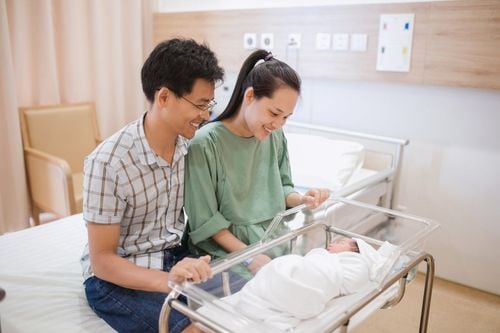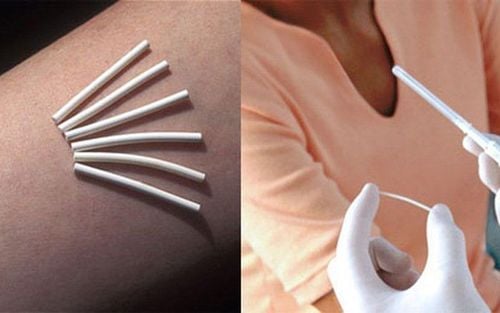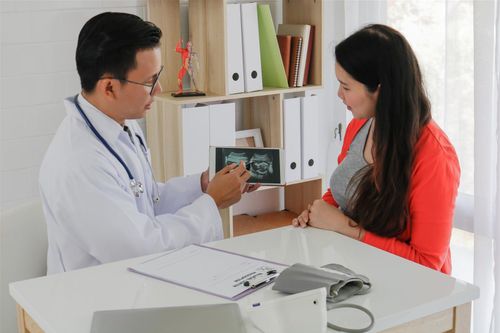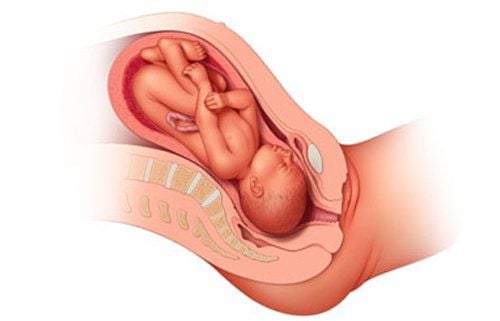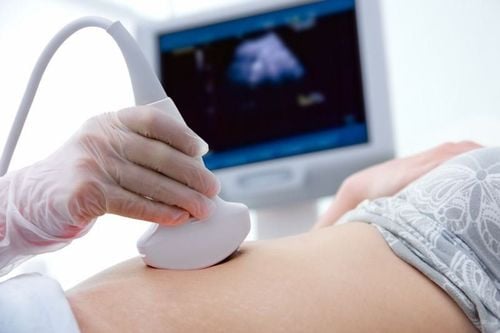This is an automatically translated article.
The article is professionally consulted by Specialist Doctor II Huynh Thi Hien - Obstetrician and Gynecologist - Department of Obstetrics and Gynecology - Vinmec Nha Trang International HospitalIn the second cesarean section, the maternal and child mortality rates related to anesthesia, severe infection, hemorrhage, and amniotic fluid embolism account for about 4-8 cases/1000 cases. Therefore, many mothers wonder when they should be hospitalized for the second cesarean section? At what week should surgery?
1. When should I be hospitalized for the 2nd caesarean section?
Having a second cesarean birth, when detecting abnormal signs after the mother, she should be hospitalized immediately:1.1. Vaginal bleeding
Pregnant women with vaginal bleeding at any time during pregnancy need prompt medical examination. Vaginal bleeding in the early first trimester of pregnancy is a common phenomenon in 15-25% of pregnant women, which can be a sign of threatened miscarriage or ectopic pregnancy. Vaginal bleeding in the late third trimester of pregnancy can also be a sign of placental abnormalities, or premature birth. The more blood volume, the more severe the severity.
Trắc nghiệm: Đặc điểm cơn đau đẻ và diễn biến cuộc chuyển dạ
Cơn đau đẻ là dấu hiệu thông báo sự chào đời của em bé. Cùng thử sức với bài trắc nghiệm sau đây sẽ giúp các bà mẹ mang thai nhận biết cơn đau đẻ và diễn biến cuộc chuyển dạ để chuẩn bị trước tâm lý những gì sắp xảy ra đối với mình.The following content is prepared under supervision of Thạc sĩ, Bác sĩ y khoa, Tạ Quốc Bản , Sản phụ khoa , Khoa Sản phụ khoa - Bệnh viện Đa khoa Quốc tế Vinmec Phú Quốc
1.2. Vaginal amniotic fluid
Normally, a pregnant woman's vagina always has a little white discharge (discharge) that is odorless or has an odor but does not smell, due to the increase in hormones during pregnancy. If you notice vaginal discharge that is more than usual, water-like, massive or continuous, has a strong fishy smell and is slightly viscous, it could be a sign of oozing/premature rupture of membranes/premature rupture of membranes. These cases are associated with the risk of premature birth, placental prolapse, and especially the risk of infection for the fetus and mother when the amniotic fluid leaks / premature rupture of membranes / premature rupture of membranes over 6 hours.
Therefore, pregnant mothers need to go to the hospital as soon as they discover vaginal amniotic fluid. The doctor will examine, monitor, and do tests to give specific indications that are appropriate depending on the status of the mother and the fetus, such as taking antibiotics, monitoring for induction of labor or continuing to keep the pregnancy.

1.3. Abnormal pain in the uterus and lower abdomen
Usually pregnant mothers can feel heaviness in the lower abdomen and back pain as the fetus grows, sometimes there are uterine contractions (tender uterus) especially when the due date is approaching. However, if there is sudden severe pain, the mother needs to go to the hospital for monitoring because it may be an abnormal sign in the uterus. If the contractions are periodic, continuous, and do not go away after 1 hour of rest, when the gestational age is less than 37 weeks, the mother needs to go to the hospital because it could be signs related to premature birth.
1.4. Your baby is not moving or is moving less than usual
Normally, a pregnant woman can feel the baby move clearly at about 16 weeks for the chick, 22 weeks for the baby. These "kicks" are the fetus' way of relating to the mother as "I'm fine". Each day, the mother chooses a time, usually after eating or during rest, to count the number of fetal movements (kicks, punches, turns, rolls) in 1 hour, along with the time it takes to get 10 movements. fetal movements, and record them on a chart. Avoid fetal sleep cycles (maybe 20 to 75 minutes).
Mothers should start counting fetal movements from 28 weeks gestation, because the greatest risk due to decreased fetal movement usually occurs in the last 3 months of pregnancy. If the number of fetal movements is less than 10 within 2 hours, it is a dangerous sign and needs to go to the hospital for immediate monitoring.
1.5. Sudden signs of the mother during pregnancy
Any one or more signs of sudden and unusual occurrence such as high fever over 38 ̊C, fainting, shortness of breath, severe headache, chest pain, vomiting, visual disturbances, convulsions should be reported. Go to the hospital for early treatment. Call an ambulance and get to the hospital as soon as possible.
2. At what week should the 2nd caesarean section be performed?
The time of the mother's second cesarean birth will be predicted by the doctor based on the health and condition of the mother and fetus. The doctor will rely on the mother's pregnancy history, information about the previous birth provided by the mother, to determine the most suitable delivery time.
So should the second cesarean delivery wait for labor? Normally, if the mother is in good health, the fetus is developing stably, the mother will have a cesarean section from the 39th week onward, before labor pain because contractions can affect the wound. scars from the first birth. From the 37th week, the baby can breathe on its own and live in the outside environment, but the mother should give birth after the 39th week of pregnancy, because the last weeks of pregnancy are the time when many important organs are in the fetus. complete. Babies born at 39 weeks have fewer health problems than babies born early. The fetus at this time also has a full layer of subcutaneous fat to help the baby maintain a stable body temperature,...

To ease the pain of childbirth, Vinmec offers a maternity package with the service of "painless delivery" ' fully during and after birth using non-morphine epidural and pudendal nerve anaesthesia. During the birth process, the mother will be guided by the midwives on how to push and breathe properly, the baby will be born in just 10-15 minutes. After birth, the baby will be cared for in a sterile room before being returned to the mother. Pregnant women will rest in a high-class hospital room, designed according to international hotel standards, 1 mother 1 room with full facilities and modern equipment. Mothers will be consulted by nutritionists on how to feed the baby before being discharged from the hospital. Postpartum follow-up with both mother and baby with leading obstetricians and paediatricians to be able to detect abnormalities in the fetus early and take timely measures.
For detailed information about all-inclusive maternity service packages, please contact the hospitals and clinics of Vinmec Health system nationwide.
Please dial HOTLINE for more information or register for an appointment HERE. Download MyVinmec app to make appointments faster and to manage your bookings easily.







